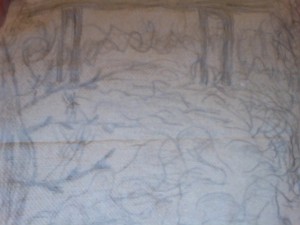Today I witnessed the beauty of the green belt once again. I had a delightful time soaking in the last rays of the sun as I have on previous occasions visiting this spot. Today I could hear the sounds of spring chirping. Crickets and birds were gearing up for the mating season, I suppose. After sitting for a little while it started to get dark, and that’s when three or four mosquitoes smelled me out.
I sat next to a tree in the dried river bed, next to a small pond only half a foot deep, yet still able to support life for a school of fishes. A couple of slender bodied spiders with long legs were spinning their evening webs in the small budding branches beside me. I hope they were able to catch some of the mosquitoes that were using the nearby pools as a breeding ground.
As I had entered the park, many people were leaving all clad in sporty synthetic clothing, backpacks, and pooches, to boot. I suppose it was feeding time for them after being in the woods for a full day. The path that I followed into the woods was smooth and finely polished due to the number of visitors that have tread there before me. Each one of their steps was like an ocean wave lapping on rough rocks on the beach, making them even and round
This got me thinking about the different ways humans change or pollute the environment. Erosion is one thing, but as I passed by the lines of people I noticed their smells. They smelled like petroleum. It was easy for me to smell because I avoid synthetics in my hygiene. I imagined how, if I was repulsed by the chemical fumes emanating from them, the woodland animals must react when their smell acuity must be greater than mine. I have no idea if the fumes humans produce pollute the environment, but it’s possible that people themselves are toxic disturbances. I cherish the fact that I can visit a place like the green belt but I wonder if nature should remain pure.
Certainly the environment around the green belt has already been dramatically altered from what it was before the settlers arrived with cattle and chopped down all the woods. And it is also likely that human activity caused the river to dry up, but should people continue to visit a landscape that has been through so much trauma already? Does the forest want us there? I’m sure it warmed up to the Native Americans who were known for living sustainable lives, but contemporary Austinites and touristy folks are far from ‘native.’
Many of the creatures in the forest are nocturnal, did I wake them up? Can they even get any sleep when the highway sounds are so close?

